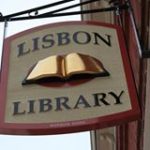The following is an excerpt of a memoir of my high school years. This is in the introduction and occurs in the summer of 1960. The story takes place in Lisbon Falls, Maine—which is where I still live.
At 13, as I moved tremulously into adolescence, I knew that, whatever I did, I was leaving childhood and my life would soon be different from what it had been, but I could not appreciate how the difference would be marked not in age but in culture. My life would now be different from that of my contemporaries. While they moved forward through the sixties, the séminaire would shape me into a person more at home with the ideas of the past than of the present. It would ingrain in me a nostalgia for the life of an era other than my own, a nostalgia for a time that was never mine.
That summer, I rode my bike to the Lisbon Falls library, my metal basket full of books, often novels set in the past—in colonial Williamsburg or perhaps in a French river town along the Mississippi. In one that I remember well, the French characters were a supporting cast for the “American” hero. The author had made his French-Canadians ever so proud to be part of the United States and no longer fettered by allegiance to their conquered homeland. As I read, I felt a certain shame for these French people. I did not understand that it was the writer and not they who needed “Americans” to be the heroes, but I had a sense of the place the author reserved for us, the French of North America.
As I rode down Route 125 into Lisbon Falls with a nickel for a treat safely tucked in my shorts pocket, I knew that my parents, when they were my age and living in tenement blocks in Lewiston, had not had books in their lives as I did now in mine. My love of books was my own, something I was discovering for myself, something that would take me to a place where I was very willing to go.
The library, housed in half a storefront, a former grocery, at the corner of Union and Main Streets, didn’t have a regular librarian. It was supervised by older Yankee women who made a social event of the three afternoons a week they opened it from 2 to 5. As I walked up and down the shelves that lined the walls looking for novels that interested me, I listened to them talk in English. It still startled me then to hear older people speaking English as later it would catch my attention—and please me—to hear young people speaking French.
After checking out my new titles, I would go outside and place them in the basket on my handlebars, but I didn’t head for home. Instead, I pedaled to Titus Oil, the gas station on Route 196, just behind the library, that had a soda machine. There I reached into my pocket, pulled out my nickel, and inserted it into a slot. Quickly, I guided a six-ounce bottle of soda down the horizontal channel. The cold water splashed until the bottle reached the spot where could I pull it out. The glass bottle was cold and wet in my hands. I heard the mechanism spring back in place. Only another nickel would release a second treat—and it would not be one of my nickels, as I was not given to excess, even as a child.
 What would happen to the memoir conversation if…
What would happen to the memoir conversation if…
- …you took a moment to present this informative post to your friends and family by linking this article on your social media? Just a click. It’s so easy.
- …you reposted this article on your own blog or website? It’s free and you’d both have some valuable content to boost your blog’s reputation and you would be providing your readers with valuable guidance. For the best procedure on how to do this, click here.
- …you subscribed to our YouTube channel?


No comments yet.